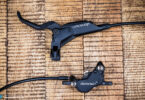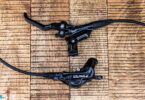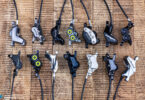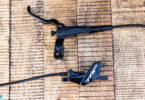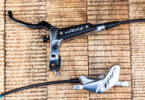As the saying goes, “all good things come in threes”. Judging by Yeti’s 2023 press kit, the Colorado-based manufacturer knows this very well. Alongside the brand new SB160 and SB120, Yeti have just unveiled the SB140, providing the golden middle of the 2023 SB range. The latest iteration of Yeti’s trail bike rolls into the new season with bigger wheels and the same technical innovations as its siblings, but maintains the same travel as its predecessor. Could it be the ideal all-rounder?
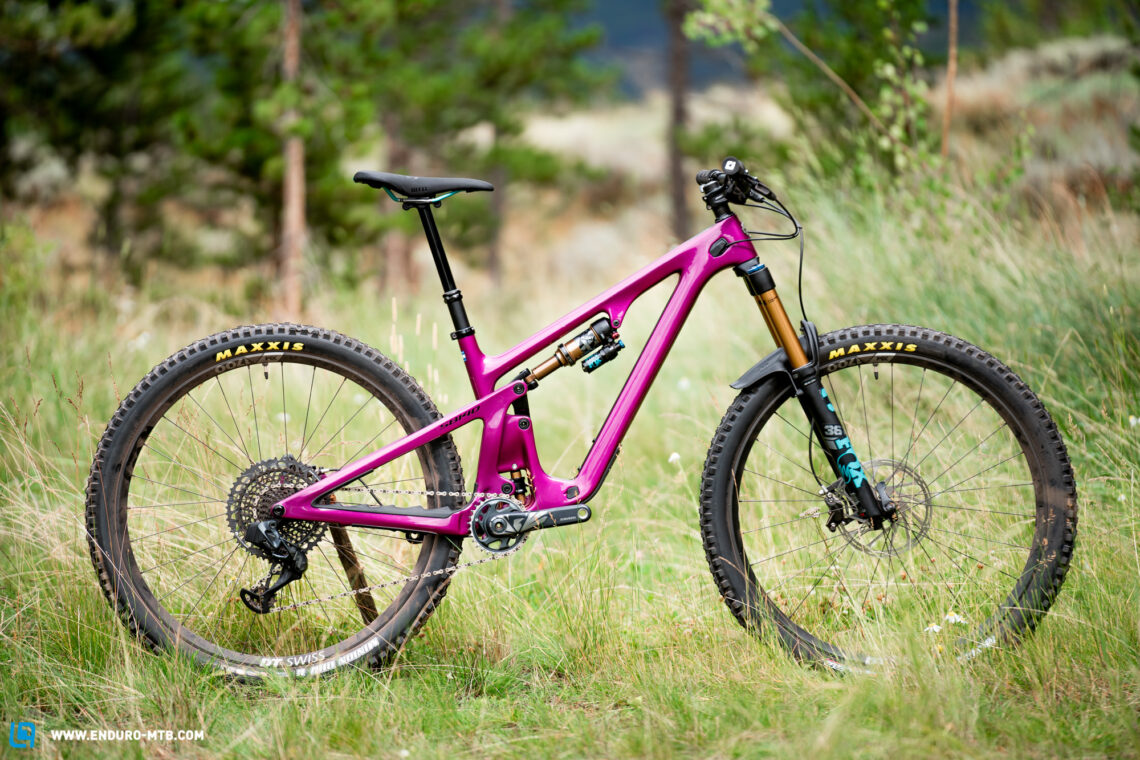
After introducing the new Yeti SB160 and SB120 in the space of just one week, the Colorado-based cult brand has just unveiled the third (and probably last bike) for the 2023 season. Since Yeti’s engineers have followed the same development approach for all three bikes, the SB140 has a lot in common with its siblings. But let’s start from the beginning!
For starters, the new SB140 2023 isn’t exactly a new bike but rather the evolution of the current SB140 iteration. Unlike its SB160 and SB120 siblings, which have more travel than their predecessors, the SB140 maintains the same travel, instead rolling into the new season with bigger 29″ wheels. But there’s more: the new version isn’t meant to replace the current 27.5” SB140 – this still forms part of Yeti’s portfolio, offering a suitable option for small-wheel devotees. As usual, Yeti divide their bikes into two groups called Race and Rip. The SB140 falls in the latter, and was conceived as an uncompromising fun machine rather than a racer. Moreover, Yeti also released a bumped-up “Lunch Ride” version of the SB140, which has 10 mm more travel upfront (160 mm) and a more downhill-oriented spec. Rear travel is the same on all versions – and it doesn’t take Sherlock Holmes to find out how much it is! As the name already suggests, the rear suspension of the SB140 generates 140 mm of rear travel. For more efficient reserve management, Yeti rely on their proprietary Switch Infinity system, which has been updated for the 2023 season. In addition, Yeti’s development team stiffened up the frame and overhauled both the geometry and rear suspension kinematics of the bike.
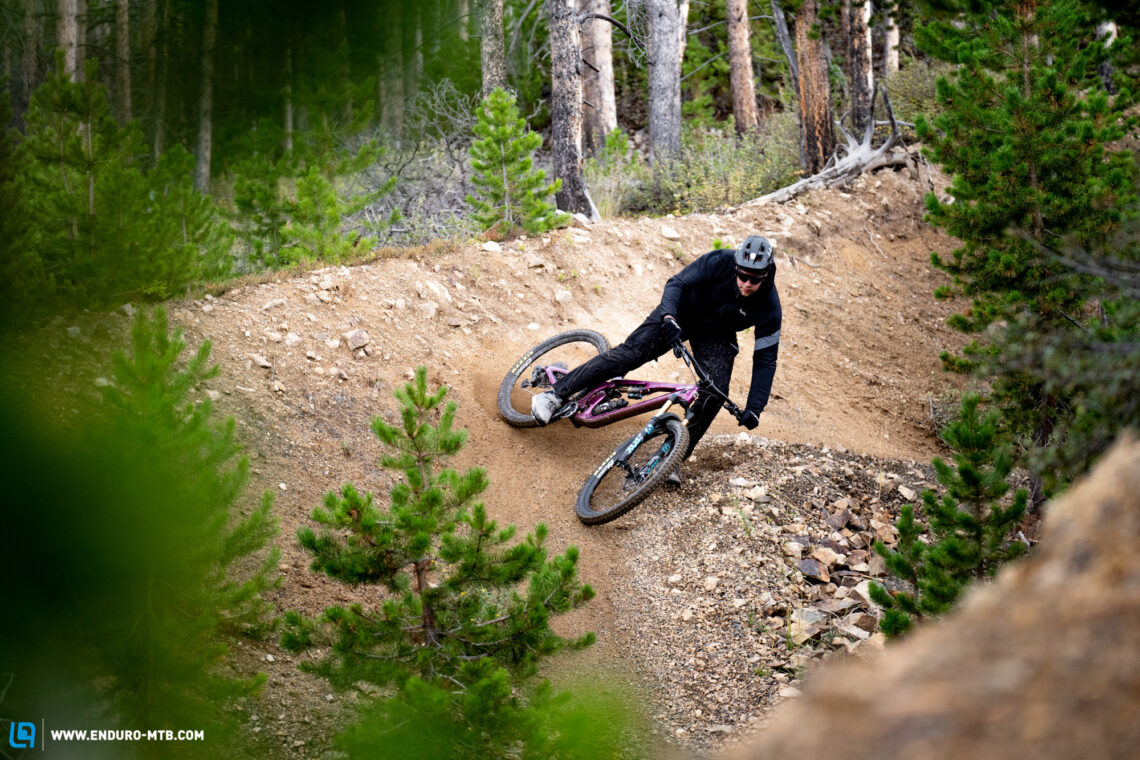
The Yeti SB140 TLR T3 2023 in detail
In typical Yeti fashion, and in line with its price, the SB140 comes in a very high-quality finish. Moreover, Yeti combine minimalist branding with several elegant accents, like the Ice Axe head badge and drifting Yeti on the seat tube – which we totally identify ourselves with.
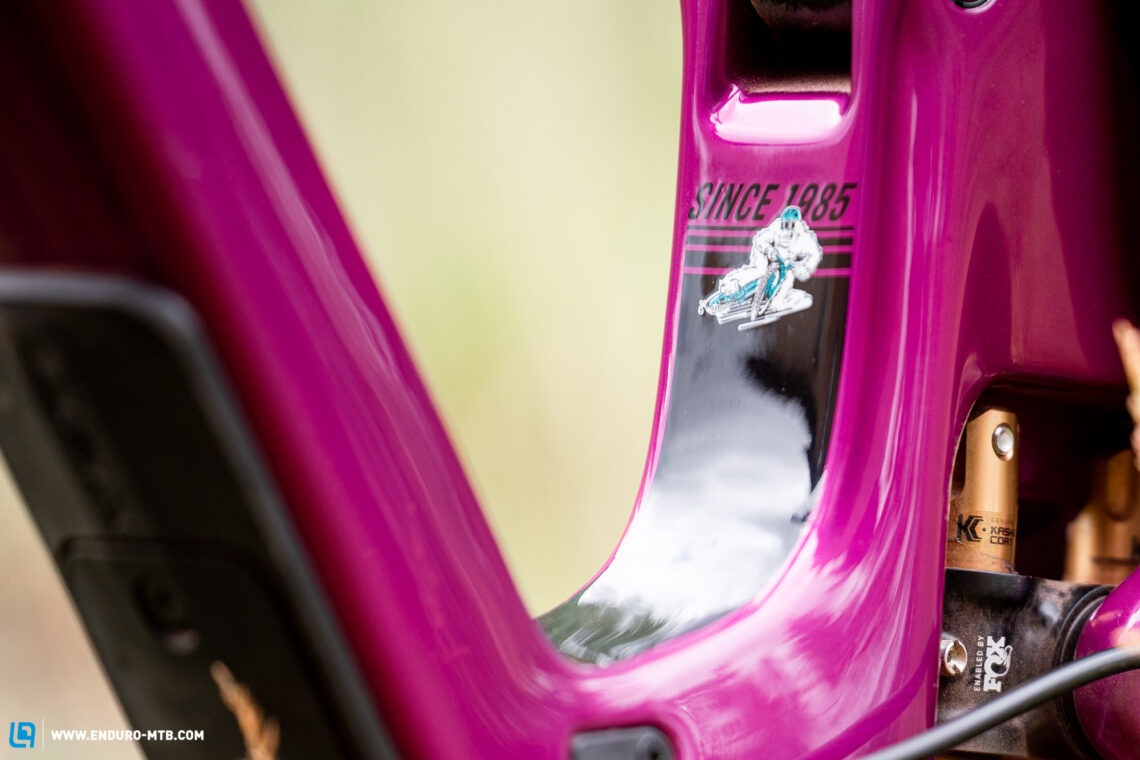
As a major update, Yeti thoroughly revised the cable routing of the SB140, adding bolted cable clamps to the ports and thus finally eliminating the annoying rattling noise of the previous SB140 model. Moreover, a small bracket at the transition from the front triangle to the swingarm holds the rear brake line firmly in place to prevent scuffs and rattling – awesome!
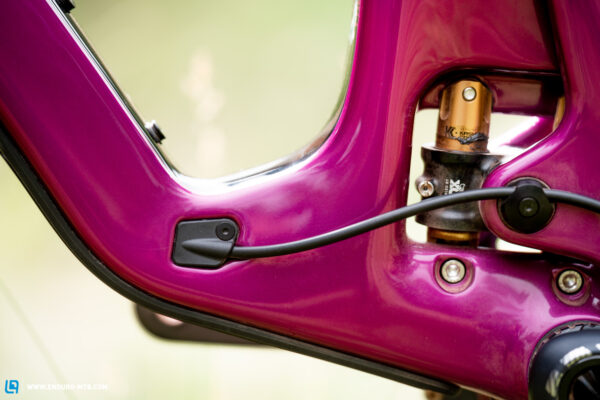
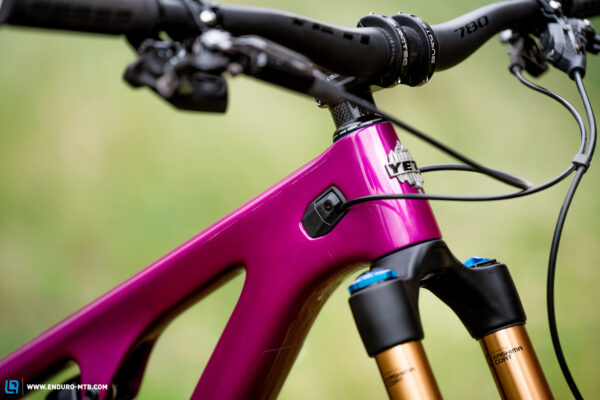
A generously sized service port on the downtube protector allows you to access the dropper post cable, making it easier to service the post. On top of that, the cover can be replaced in case of damage. The seat and chainstay protector is now bigger and ribbed, ensuring a quiet ride and preventing paint chips. However, Yeti forgo a tool mount and integrated storage compartment.
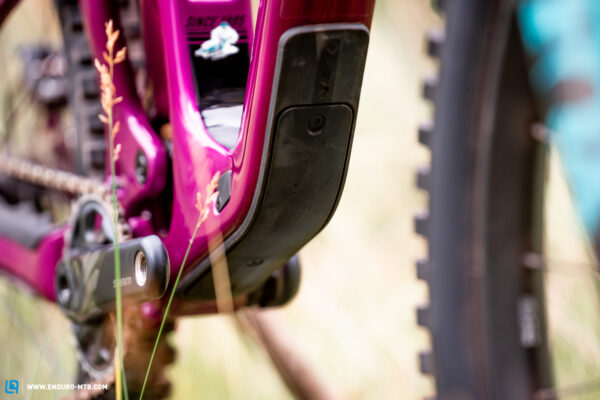
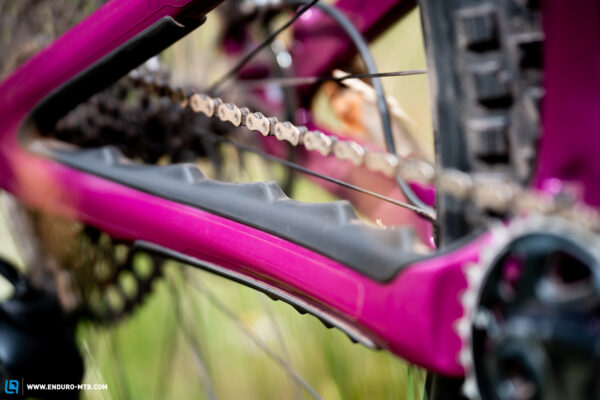
The spec variants of the new Yeti SB140 2023
In typical Yeti fashion, the frame of the Yeti SB140 is available in two different grades of carbon fibre, called Turq (T) and Carbon (C). The premium T model relies on higher modulus carbon fibres, allowing engineers to achieve the same degree of stiffness at a lower weight and thus saving around 225 g per frame. Alongside the conventional SB140, which comes standard with a 150 mm fork, Yeti have also released a beefed-up Lunch Ride Edition model (TLR and CLR), which has 10 mm more travel at the front and a more downhill oriented spec, including a piggyback rear shock, more powerful brakes and tires with a tougher casing. The Lunch Ride Edition is available in three T variants and just as many C versions. The conventional SB140, on the other hand, is available in a total of three T and two C variants. For the European and UK market, however, Yeti will only be releasing one T1 and one C2 Lunch Ride version for the time being. Prices for the new SB140 range between $6,400 and $11,700. Old-school Yeti enthusiasts can choose their new bike in Yeti’s legendary turquoise finish while everyone else can pick from three more discreet paint jobs called Raw Carbon, Sage and Sangria, although the latter might bring up some bad memories for some;)
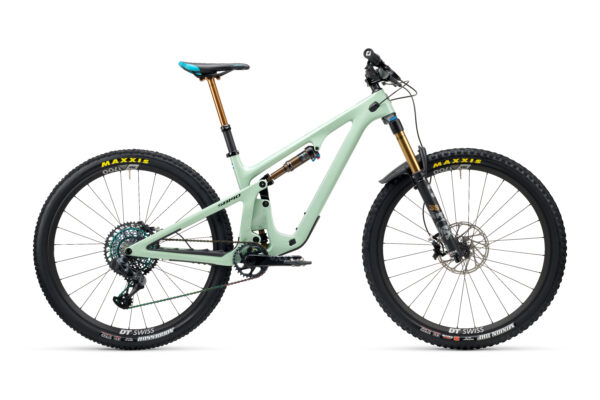
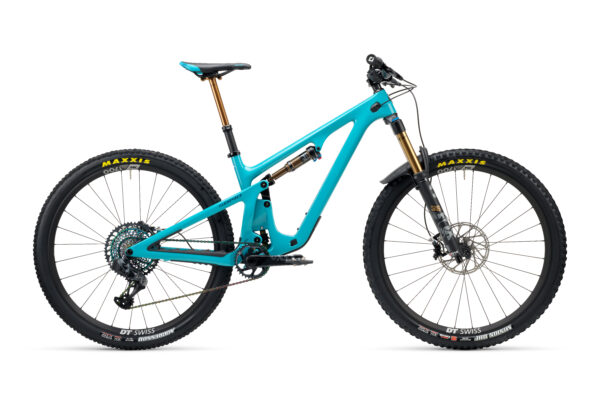
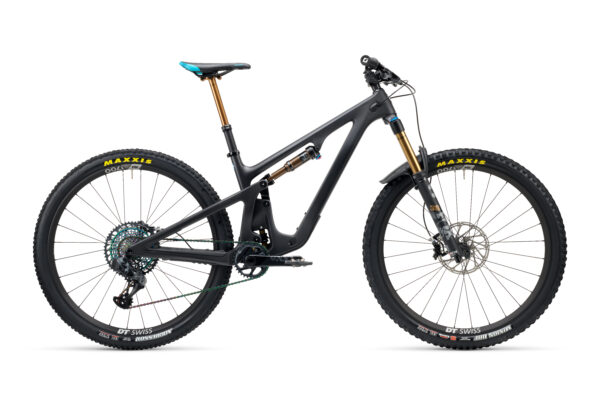
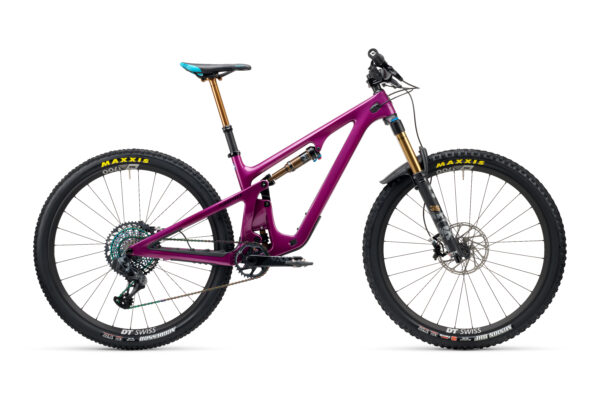
Yeti’s proprietary Switch Infinity System
Yeti unveiled their proprietary Switch Infinity System almost 9 years ago and have been using it on all their full-suspension models ever since. What looks at first like a double-shaft FOX shock is actually a translating pivot, which slides up and down on a set of rails as it goes through its travel, thereby creating a virtual pivot point. This provides different suspension characteristics at different points in the travel. Anti-squat values form a flat peak around the SAG point, resulting in pedal-neutral rear suspension and an efficient ride. As the suspension moves beyond around 50% of its travel, the Switch Infinity changes direction and the anti-squat rapidly reduces, reducing pedal kick-back during big impacts to ensure a more composed ride. Moreover, the system should make it easier for engineers to fine tune the suspension kinematics. For all T-series models, Yeti developed new high-quality bearings, seals and shock hardware to ensure smooth operation and a longer service life. C-series models, on the other hand, still rely on the same hardware as the current SB140.

Our Yeti SB140 TLR T3 2023 test bike

Yeti SB140 TLR T3 2023
Specifications
Fork FOX 36 Factory GRIP2 160 mm
Rear Shock FOX FLOAT X Factory 140 mm
Seatpost FOX Transfer 200 mm
Brakes SRAM CODE RSC 200/180 mm
Drivetrain SRAM XX1/X01/GX AXS 1x12
Stem Burgtec Enduro MK3 50 mm
Handlebar Yeti Carbon 780 mm
Wheelset DT Swiss XM1700 29"
Tires MAXXIS Minion DHF MaxxTerra EXO/Minion DHR MaxxTerra EXO 2.5/2.4
Technical Data
Size S M L XL XXL
Weight 14,1 kg (Manufacturer specification)
Since we tested the new SB140 at Yeti’s headquarters in Colorado, we rode the Lunch Ride T3 version, which isn’t currently available for purchase in Europe or the UK. However, the European T1 variant only differs marginally from its American counterpart, using a cable-operated drivetrain instead of the wireless SRAM AXS drivetrain. Our Lunch Ride test bike comes equipped with a mixed, wireless SRAM drivetrain consisting of an XX1 rear derailleur, X01 cassette and GX chain. While at first glance the bling rear derailleur suggests a top-end drivetrain, upon closer inspection you can’t help but feel cheated, because this is paired with a cheaper and heavier cassette and chain. However, this doesn’t compromise shifting performance on the trail.
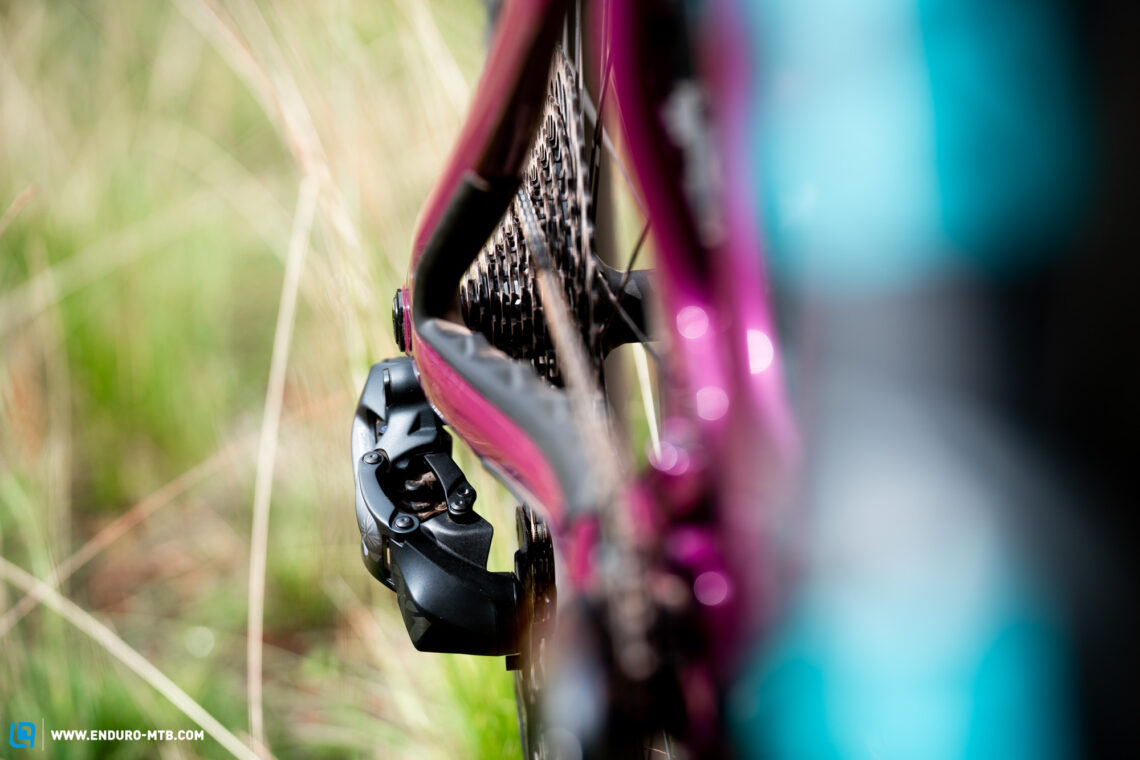
SRAM Code RSC four-piston brakes with tool free bite point and reach adjustment provide powerful and reliable deceleration and are combined with a 200 mm rotor at the front and 180 mm disc at the rear. For heavy riders and long descents, we recommend upgrading to a bigger rear rotor.
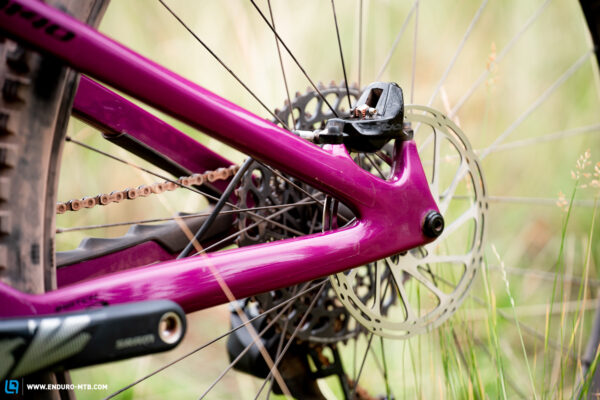

The suspension consists of a high-end 160 mm FOX 36 Factory GRIP2 fork and matching FOX Float X Factory air shock. The superior GRIP2 damper of the former offers countless adjustment options, allowing you to fine tune your fork to your needs and riding style, while the shock features external low-speed rebound and compression adjustments as well as a climb switch. FOX also supply the Transfer Performance dropper post, which offers a whopping 200 mm travel (from size L upwards) and can be fully inserted into the frame.
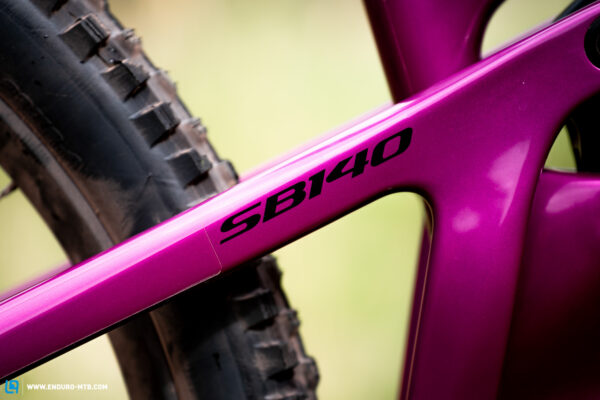
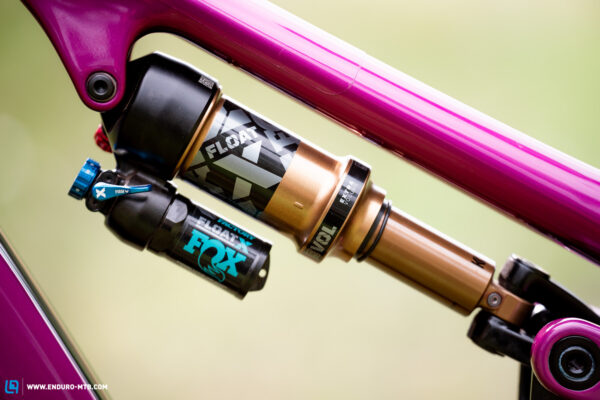
The cockpit consists of a 50 mm Burgtec Enduro stem and Yeti’s own-brand 780 mm carbon handlebars. DT Swiss supply the XM 1700 alloy wheelset, which can be upgraded to an EXC 1501 carbon version for an additional charge. The wheels are paired with a MAXXIS 2.5″ Minion DHF at the front and 2.4″ Minion DHR II at the rear. Unfortunately, both tires come in the puncture prone EXO casing and harder MaxxTerra rubber compound. However, we would have preferred more robust tires with a tougher casing, like MAXXIS’ EXO+ (or even DoubleDown for more aggressive riders) and the softer MaxxGrip rubber compound at the front.
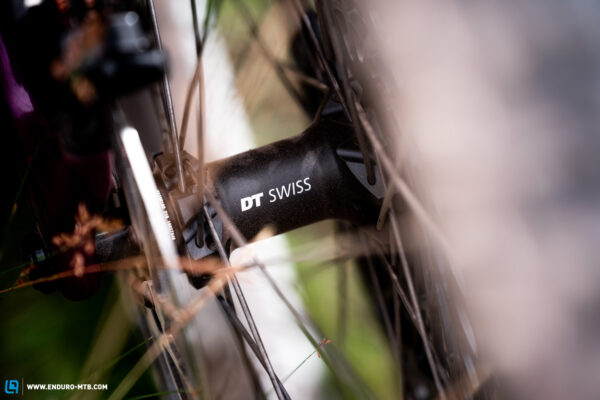
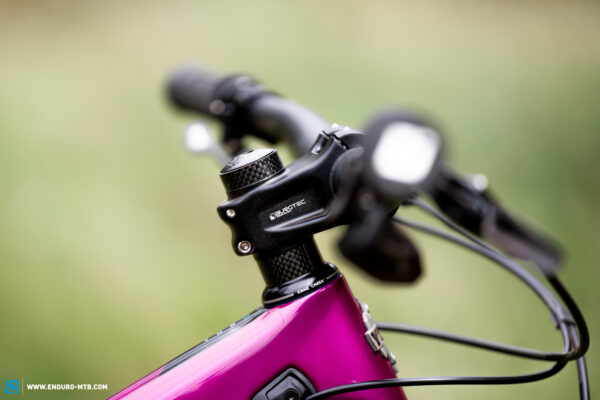
The geometry of the Yeti SB140 TLR 2023
The SB140 Lunch Ride Edition is available in 5 sizes, S to XXL, offering a suitable option for riders between 155 and 210 cm tall. Reach is 505 mm in size XL and grows in sensible intervals between sizes, allowing most riders to choose from at least two sizes. The seat tube is reasonably short across the board, giving you even more freedom when it comes to choosing your size. Moreover, from MY 2023 Yeti have also adapted the chainstay length to the respective frame size, ensuring consistent handling across the board.
| Size | S | M | L | XL | XXL |
|---|---|---|---|---|---|
| Seat tube | 365 mm | 400 mm | 440 mm | 470 mm | 485 mm |
| Top tube | 573 mm | 603 mm | 624 mm | 652 mm | 671 mm |
| Head tube | 92 mm | 95 mm | 100 mm | 112 mm | 134 mm |
| Head angle | 65° | 65° | 65° | 65° | 65° |
| Seat angle | 77° | 77° | 77° | 77° | 77° |
| Chainstay | 436 mm | 438 mm | 440 mm | 442 mm | 444 mm |
| Wheelbase | 1.188 mm | 1.221 mm | 1.246 mm | 1.277 mm | 1.304 mm |
| Reach | 430 mm | 460 mm | 480 mm | 505 mm | 520 mm |
| Stack | 617 mm | 620 mm | 625 mm | 635 mm | 655 mm |
Yeti SB140 TLR T3 2023 first ride review
While visiting Yeti in Colorado, we had the chance to put the SB140 TLR T3 2023 through the wringer for a whole day on the rocky trails of the Centennial State. On your way to the trailhead, the Yeti puts you in a comfortable pedalling position. Even on steeper climbs, the front wheel remains planted on the trail, allowing you to thread your way through windy singletrack climbs with ease and confidence. The rear suspension always remains active, generating decent traction without swallowing up too much energy.
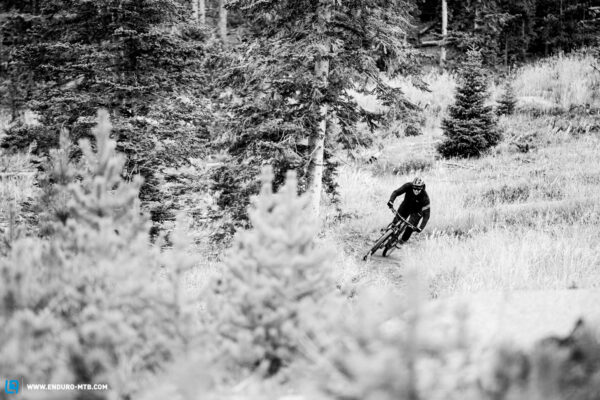
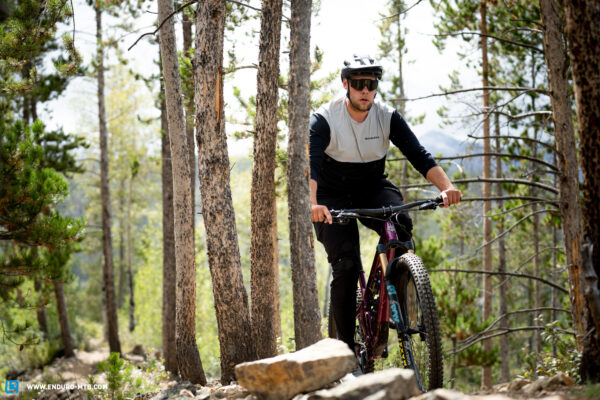
As soon as you turn its nose into the valley, the SB140 TLR puts a massive grin on your face. The suspension works sensitively and strikes an excellent balance between traction and support without providing too much of either, allowing you to generate speed by pumping through rollers and berms. At the same time, the integrated and balanced riding position inspires confidence, encouraging you to keep your fingers off the brakes for a few more seconds and begging you to drift from one trail feature into the next.
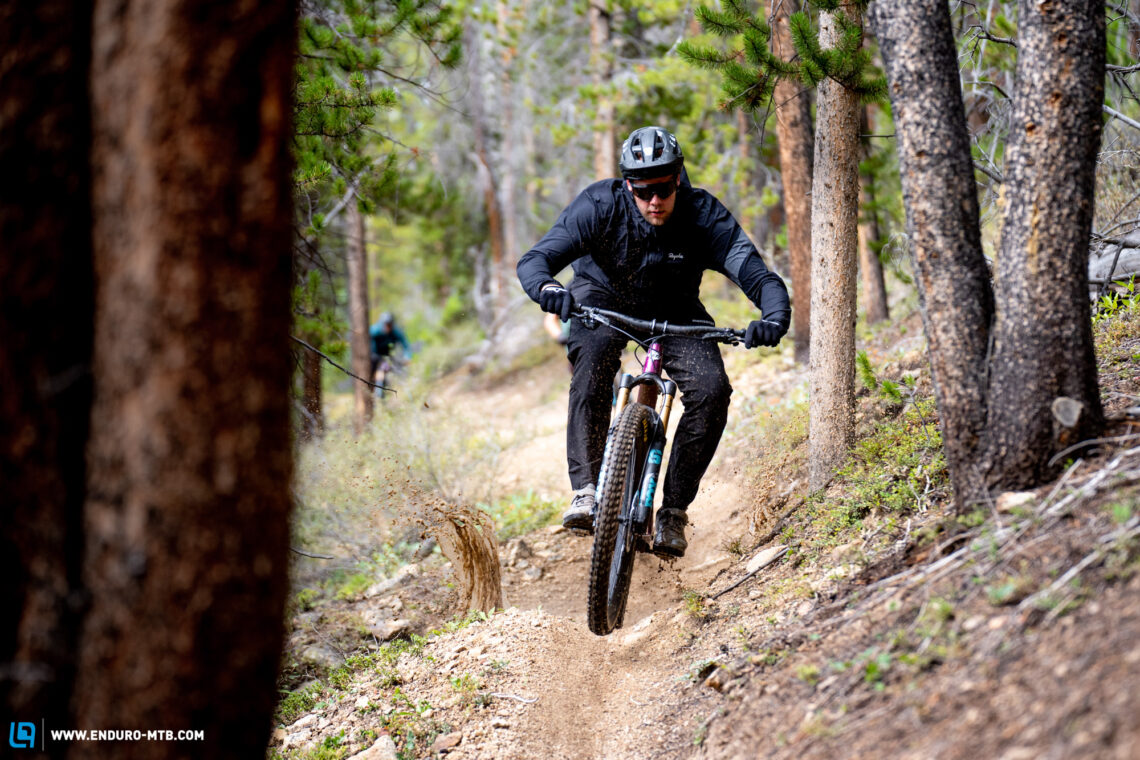
New Yeti SB140 TLR T3 2023 – our conclusions
With the updated SB140, the Colorado-based manufacturer managed to score a hat trick in just under a week. The latest iteration of Yeti’s trail classic drifts into the new season with several updated frame details, top-notch workmanship and a solid spec – we only recommend upgrading the tires! On the trail, the new SB140 proves to be a strong all-rounder, convincing uphill with a touring-compatible pedalling position, while at the same time putting a massive grin on your face downhill with its excellent suspension.
Tops
- High-quality frame with clever detail solutions
- A successful evolution of its predecessor
- Strong allrounder for fun laps
Flops
- Tires don’t do justice to the bike’s potential
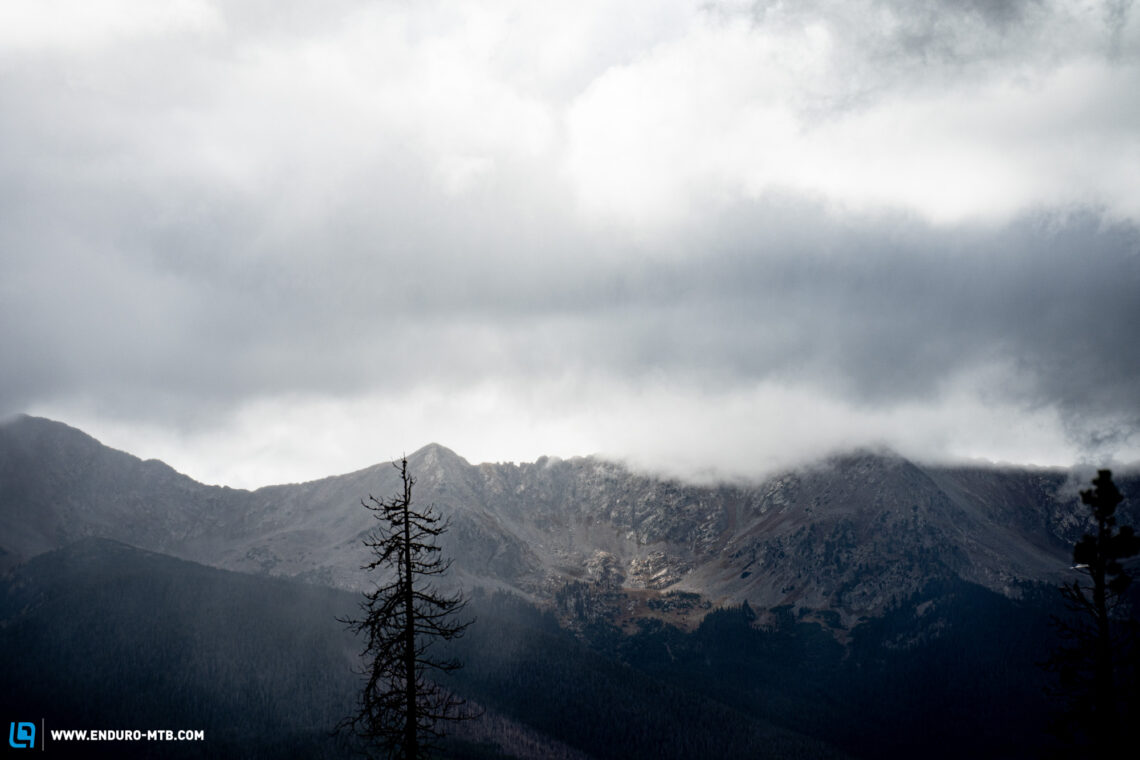
For more info visit Yeti’s website.
Did you enjoy this article? If so, we would be stoked if you decide to support us with a monthly contribution. By becoming a supporter of ENDURO, you will help secure a sustainable future for high-quality mountain bike journalism. Click here to learn more.
Words: Peter Walker Photos: Calum McGee/Yeti-Cycles




